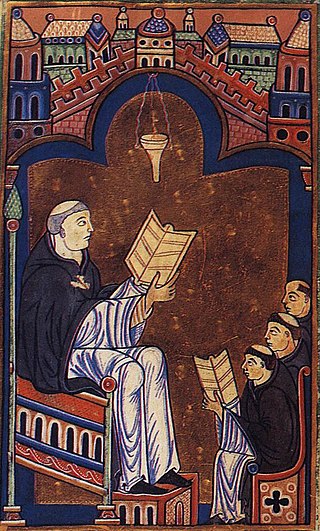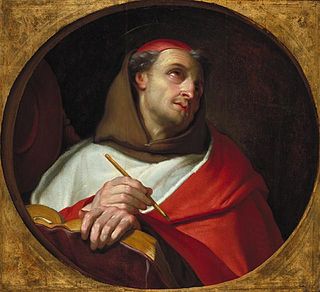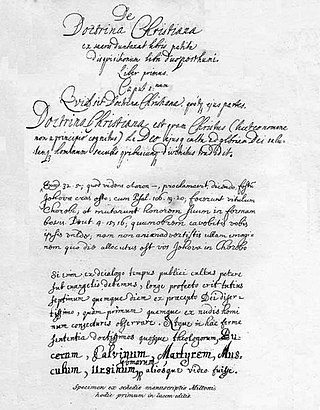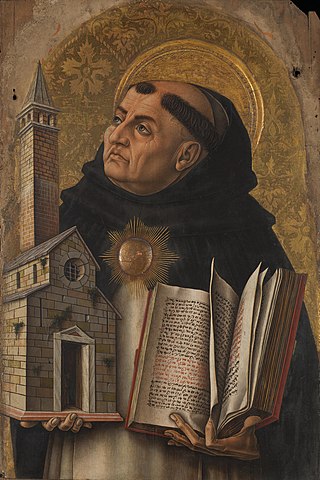Works
His principal work is a mystical theology first published at Barcelona in 1662 under the title Mystica theologia D. Thomae, utriusque theologiae scolasticae et mysticae principis, etc.
Three years later, 1665, a new and augmented edition appeared. The second edition exceeded the first by eighty-five pages. The work having become rare and difficult to obtain, a new edition was brought out by the Dominican Jean Berthier at Turin, 1890. It contains the text of the original edition of 1662 in the body of the work, and the editions which appeared in the edition of 1665 in the form of added notes are given in an appendix.
The doctrine of the book is the doctrine of Thomas Aquinas, of which the author writes in his prologue:
- "The mystical doctrine of St. Thomas is of such great authority, precisely because it is founded on Scholastic doctrine, that it can scarcely be expressed in words. That mystic doctrine which is not repugnant to the principles of scholastic doctrine has a firm foundation, and therefore readers who study mystical theology in St. Thomas find it firm and well-established; on the contrary, those who read it in other books which treat of mystical matters alone, without any teacher or guide, under the appearance of devotion in somewhat severe words, absorb material for errors."
Besides his Mystical Theology Vallgornera is the author of a book on the Rosary of the Blessed Virgin, De Rosario B. Marix Virginis, which appeared at Barcelona about 1662. It consists of pious meditations.

Proclus Lycius, called Proclus the Successor, was a Greek Neoplatonist philosopher, one of the last major classical philosophers of late antiquity. He set forth one of the most elaborate and fully developed systems of Neoplatonism and, through later interpreters and translators, exerted an influence on Byzantine philosophy, Early Islamic philosophy, Scholastic philosophy, and German Idealism, especially G.W.F. Hegel, who called Proclus's Platonic Theology "the true turning point or transition from ancient to modern times, from ancient philosophy to Christianity."

Richard of Saint Victor was a Medieval Scottish philosopher and theologian and one of the most influential religious thinkers of his time. A canon regular, he was a prominent mystical theologian, and was prior of the famous Augustinian Abbey of Saint Victor in Paris from 1162 until his death in 1173.

Scholasticism was a medieval school of philosophy that employed a critical organic method of philosophical analysis predicated upon the Aristotelian 10 Categories. Christian scholasticism emerged within the monastic schools that translated scholastic Judeo-Islamic philosophies, and thereby "rediscovered" the collected works of Aristotle. Endeavoring to harmonize his metaphysics and its account of a prime mover with the Latin Catholic dogmatic trinitarian theology, these monastic schools became the basis of the earliest European medieval universities, contributing to the development of modern science; scholasticism dominated education in Europe from about 1100 to 1700. The rise of scholasticism was closely associated with these schools that flourished in Italy, France, Portugal, Spain and England.

Bonaventure was an Italian Catholic Franciscan bishop, cardinal, scholastic theologian and philosopher.
Systematic theology, or systematics, is a discipline of Christian theology that formulates an orderly, rational, and coherent account of the doctrines of the Christian faith. It addresses issues such as what the Bible teaches about certain topics or what is true about God and His universe. It also builds on biblical disciplines, church history, as well as biblical and historical theology. Systematic theology shares its systematic tasks with other disciplines such as constructive theology, dogmatics, ethics, apologetics, and philosophy of religion.

The Summa contra Gentiles is one of the best-known treatises by Thomas Aquinas, written as four books between 1259 and 1265.
Ascetical theology is the organized study or presentation of spiritual teachings found in Christian Scripture and the Church Fathers that help the faithful to more perfectly follow Christ and attain to Christian perfection. Christian asceticism is commonly thought to imply self-denial for a spiritual purpose. The term ascetical theology is used primarily in Roman Catholic theology; Eastern Orthodox theology carries its own distinct terms and definitions, and other religious traditions conceive of following and conforming to God and Christ differently from either Orthodoxy or Catholicism.

The Summa Theologiae or Summa Theologica, often referred to simply as the Summa, is the best-known work of Thomas Aquinas (1225–1274), a scholastic theologian and Doctor of the Church. It is a compendium of all of the main theological teachings of the Catholic Church, intended to be an instructional guide for theology students, including seminarians and the literate laity. Presenting the reasoning for almost all points of Christian theology in the West, topics of the Summa follow the following cycle: God; Creation, Man; Man's purpose; Christ; the Sacraments; and back to God.
Summa and its diminutive summula was a medieval didactics literary genre written in Latin, born during the 12th century, and popularized in 13th century Europe. In its simplest sense, they might be considered texts that 'sum up' knowledge in a field, such as the compendiums of theology, philosophy and canon law. Their function during the Middle Ages was largely as manuals or handbooks of necessary knowledge used by individuals who would not advance their studies any further.

Neo-scholasticism is a revival and development of medieval scholasticism in Catholic theology and philosophy which began in the second half of the 19th century.

Réginald Marie Garrigou-Lagrange was a French Dominican friar, philosopher and theologian. Garrigou-Lagrange was a neo-Thomist theologian, recognized along with Édouard Hugon and Martin Grabmann as distinguished theologians of the 20th century. As professor at the Pontifical University of Saint Thomas Aquinas, he taught dogmatic and spiritual theology in Rome from 1909 to 1959. There he wrote The Three Ages of the Interior Life in 1938.
Vincent Baron was a French Dominican theologian and preacher.
John of St. Thomas, O.P., born João Poinsot, was a Portuguese Dominican friar, Thomist theologian, and professor of philosophy. He is known for being an early theorist in the field of semiotics.
Daniel O'Daly, also known as Dominic Ó Dálaigh and Dominic de Rosario, was an Irish Dominican priest, diplomat and historian. He established the College of Corpo Santo in Lisbon, Portugal for Irish students wishing to study for the priesthood.

Domingo Báñez was a Spanish Dominican and Scholastic theologian. The qualifying Mondragonensis sometimes attached to his name seems to refer to the birthplace of his father, Juan Báñez, at Mondragón in Guipúzcoa.

De Doctrina Christiana is a theological treatise of the English poet and thinker John Milton (1608–1674), containing a systematic exposition of his religious views. The Latin manuscript "De Doctrina" was found in 1823 and published in 1825. The authorship of the work is debatable. In favor of the theory of the non-authenticity of the text, comments are made both over its content, and it is difficult to imagine that such a complex text could be written by a blind person. However, after nearly a century of interdisciplinary research, it is generally accepted that the manuscript belongs to Milton. The course of work on the manuscript, its fate after the death of the author, and the reasons for which it was not published during his lifetime are well established. The most common nowadays point of view on De Doctrina Christiana is to consider it as a theological commentary on poems.
Catholic dogmatic theology can be defined as "a special branch of theology, the object of which is to present a scientific and connected view of the accepted doctrines of the Christian faith."

Thomas Aquinas was an Italian Dominican friar and priest, an influential philosopher and theologian, and a jurist in the tradition of scholasticism from the county of Aquino in the Kingdom of Sicily.

Medieval philosophy is the philosophy that existed through the Middle Ages, the period roughly extending from the fall of the Western Roman Empire in the 5th century until after the Renaissance in the 13th and 14th centuries. Medieval philosophy, understood as a project of independent philosophical inquiry, began in Baghdad, in the middle of the 8th century, and in France, in the itinerant court of Charlemagne, in the last quarter of the 8th century. It is defined partly by the process of rediscovering the ancient culture developed in Greece and Rome during the Classical period, and partly by the need to address theological problems and to integrate sacred doctrine with secular learning. This is one of the defining characteristics in this time period. Understanding God was the focal point of study of the philosophers at that time, Muslim and Christian alike.

Spanish philosophy is the philosophical tradition of the people of territories that make up the modern day nation of Spain and of its citizens abroad. Although Spanish philosophical thought had a profound influence on philosophical traditions throughout Latin America, political turmoil within Spain throughout the 20th century diminished the influence of Spanish philosophy in international contexts. Within Spain during this period, fictional novels written with philosophical underpinnings were influential, leading to some of the first modernist European novels, such as the works of Miguel de Unamuno and Pío Baroja.











